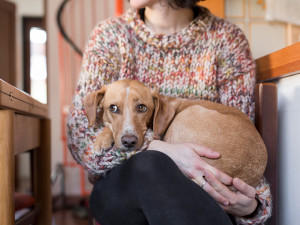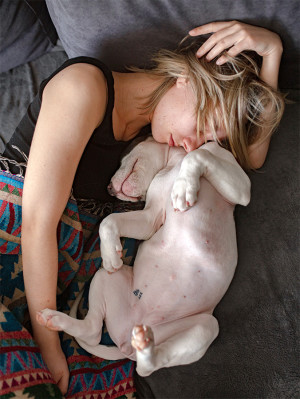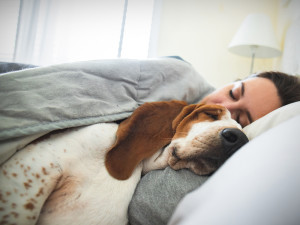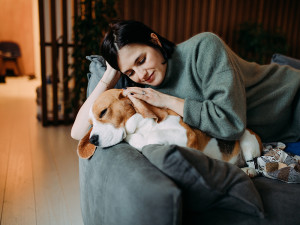Why Is Your Dog Shaking In Their Sleep? Learn If This Is Normal
We detail everything you need to know about this common dog-sleep behavior.

Share Article
In This Article:
Understanding Dog Sleep Patterns Reasons Why Your Dog Could Be Shaking In Their Sleep When Should You Be Concerned About Dog Shaking Patterns In Sleep Tips to Help Your Dog Sleep Better
Dogs demonstrate many curious behaviors, such as shaking or twitching during sleep. It can be challenging to decide if the behavior is just normal sleep behavior or if you should be concerned. This article will discuss why your dog may shake in their sleep and when you should see your veterinarian.
By understanding more about your dog’s sleep patterns and when there are signs of trouble, you can do your best to keep your pup happy and healthy.
Understanding dog-sleep patterns
If you’ve ever read about human-sleep patterns, you’re a step ahead because dogs are similar. They have different stages of sleep, including light sleep, deep sleep, and rapid eye movement (REM) sleep. Each stage is integral to keeping your dog healthy and their mental acuity functioning correctly.

Your dog appears very relaxed but is still a bit alert during light sleep, a phase during which the body transitions into deep sleep for better rest. Deep sleep, on the other hand, is the stage when the body repairs itself and consolidates memories. Finally, during REM sleep, the brain becomes highly active, which is when dreaming occurs. When dreaming, dogs may vocalize, shake, or twitch, and when they do that, they are processing memories or experiences.
Puppies and senior dogs often show more pronounced movements during sleep because puppies are at a time in their lives when they are experiencing heightened neural development, making their sleep movements more active. On the other hand, senior dogs may have exaggerated movements due to age-related changes in their nervous system.
In addition to age, breed and daily activity levels can influence a dog’s sleep. For example, smaller high-energy breeds may be more active during their dream phase, while larger breeds may show less movement and sleep more deeply.
Reasons why your dog could be shaking in their sleep
Most of the time, shaking is nothing to be concerned about. But because occasionally their movements can indicate a problem, it’s essential to understand the difference between normal sleep movements and signs of an underlying issue. Here are a few reasons why your dog could be shaking in their sleep.
Dreaming
The most common reason for a dog to shake during sleep is dreaming. What do they dream about? Just like people, are probably dreamin g about their day’s activities. If their legs are moving, they could be dreaming about running. Soft whimpers or barks may accompany this. Puppies may dream more or with more energy because they have so many new things happening in their lives. If your dog’s shaking aligns with their dream-like movements, you can rest assured that this is a normal part of their sleep cycle.
Shaker syndrome
Shaker syndromeopens in new tab, or generalized tremor syndrome (GTS), is a condition in which involuntary tremors occur. Sometimes, the tremors, which are often rhythmic, occur both during the day when the dog is awake and at night.
A large dog can get shaker syndrome, but we see it more in small breeds. It’s important to see a vet if this persists. Sometimes, medication is needed.
Seizure
Seizures can occur during the day or night. At night, they can sometimes resemble normal REM movements like regular twitching or dreaming. However, seizures are more intense and may include drooling, uncontrollable shaking, or rigid limbs.
If you think your dog is having seizures during the night, causes can include epilepsy, head trauma, or other underlying medical conditions. You may notice your dog being more tired during the day or having other behavioral changes. If you think your dog is having seizures, you should see a vet right away. As with most conditions, early diagnosis and treatment will improve outcomes.
Poisoning
Tremors or shaking during sleep can be a symptom of poisoning. It is not unusual for a dog to get into household products, certain human foods such as chocolate, or toxic plants. Symptoms of poisoning may include tremors, vomiting, diarrhea, or lethargy.
Quick action is crucial if other poisoning symptoms accompany your dog’s shaking. Contact your veterinarian or an animal poison control center for immediate guidance. Provide as much information as possible about the substance your dog may have ingested to ensure they receive the appropriate treatment.
Pain
Shaking during sleep can be caused by pain. It can be accompanied by pacing or difficulty finding a comfortable position. The pain can be caused by arthritis, injury, or illness. It may be accompanied by limping, whining, lying still, and not moving.
If your dog is having these symptoms, a vet visit is essential. There are pain meds, physical therapy, or treatment for most illnesses.
When should you be concerned about dog shaking patterns in sleep
While occasional twitching or shaking during sleep is generally harmless, there are situations where you should be concerned. Recognizing the warning signs of abnormal sleep behaviors can help you address potential issues early.
Signs that warrant concern include:
Shaking that is prolonged or unusually intense
Other accompanying symptoms such as vomiting, difficulty breathing, or lethargy
Signs of pain or discomfort
A sudden change in your dog’s sleep patterns
Shaking that occurs consistently and disrupts your dog’s rest
When to consult a veterinarian
It’s always better to err on the side of caution. Consult your veterinarian if you’re unsure whether your dog’s shaking is normal. Provide detailed information about your dog’s behavior, including any other unusual symptoms or recent changes in their routine. Diagnostic tests such as blood work, imaging, or neurological evaluations may be recommended to rule out underlying conditions.
Tips to help your dog sleep better
Ensuring your dog gets quality sleep can improve their overall health and well-being. Here are some tips to promote better sleep:
You probably know from personal experience that it is easier to sleep well if you find your bed comfortable. Your dog is no different. Orthopedic beds can be very helpful for dogs with arthritis. Be sure to provide a bed that fits your dog’s size and needs. Try to keep the sleeping area clean, quiet, and free from drafts.
Dogs, just like babies, do best with a consistent routine. Keep bedtime at the same time each night. Create a bedtime routine that could include a short walk, light play, gentle grooming, or massage to let your dog know it’s time to calm down in preparation for sleep.
Make sure your dog is getting enough exercise, play, and mental stimulation during the day. They are more likely to sleep well at night if tired from the day’s activities.
Your dog will have a more difficult time settling down at night if there are loud noises, a change in routine, or unknown visitors. A calm, quiet environment right at bedtime will make it easier. You may even want to use pheromones or a white noise machine.
Do not feed large meals before bedtime. That can lead to discomfort or restlessness. Provide fresh water that your dog can access throughout the night.
Stay up-to-date with vet visits. Your vet can detect health issues that could interfere with your pup’s sleep. Pain, anxiety, or allergies can interfere with sleep.
Try following these tips and see if your dog sleeps better and has less shaking.
References
Bryce, Ani, et al. “Shake It Off: Investigating the Function of a Domestic Dog Behavior in Social Contexts.” Animals, vol. 14, no. 22, 13 Nov. 2024, pp. 3248–3248, www.mdpi.com/2076-2615/14/22/3248, https://doi.org/10.3390/ani14223248opens in new tab.
Mondino, Alejandra, et al. “Sleep Disorders in Dogs: A Pathophysiological and Clinical Review.” Topics in Companion Animal Medicine, vol. 43, June 2021, p. 100516, https://doi.org/10.1016/j.tcam.2021.100516opens in new tab.
“Shaker Syndrome in Dogs | VCA Animal Hospitals.” Vca, 2022, vcahospitals.com/know-your-pet/shaker-syndrome-in-dogsopens in new tab. Accessed 27 Jan. 2025.
Schork, Ivana Gabriela, et al. “How Environmental Conditions Affect Sleep? An Investigation in Domestic Dogs (Canis Lupus Familiaris).” Behavioural Processes, vol. 199, 1 June 2022, p. 104662, www.sciencedirect.com/science/article/pii/S0376635722000791, https://doi.org/10.1016/j.beproc.2022.104662opens in new tab.

Dr. Shelby Neely, DVM
Dr. Shelby Neely is a freelance writer and veterinarian who graduated from the University of Pennsylvania School of Veterinary Medicine and has practiced veterinary medicine for 30 years, specializing in small animals. Her work has appeared in Allivet, AsktheCatDoctor, WhiskerDocs, Ask the Cat Doctor Radio, Ask the Cat Doctor TV, and numerous other websites, brochures, newsletters, newspapers, and ebooks. In her spare time, Dr. Neely likes to spend time with her three children, two grandchildren, three cats, two grand-cats, and five grand-dogs.
Related articles
![shy dog frightened in the arms of the owner. this brown mixed-breed hound puppy has a sweet gaze. the female owner has a wool sweater]()
Why Is My Dog Shaking? Causes and Treatment
A vet explains why the weather isn’t always to blame.
Why Does My Dog Keep Shaking Their Head?
They can’t be saying no that much.
Can Dogs Have Panic Attacks, Too?
How to tell if your dog is super stressed.
Why Does My Dog Twitch In Their Sleep?
They could be dreaming sweet little dreams of you, but that’s not all.
![Woman and dog sleeping together in bed]()
Where Should Your Dog Sleep at Nighttime?
It’s a personal preference, but here are the pros and cons.
![Dog with sleep startle reflex. Woman lays on her couch and gently wakes up her dog]()
Why Does My Dog Freak Out When I Wake Them Up?
“Let sleeping dogs lie” is more than just a confusing old saying.





